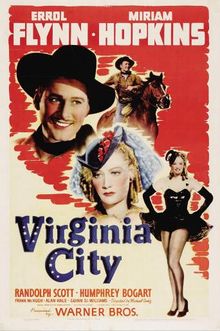
VIRGINIA CITY
US, 1940, 121 minutes, Black and white.
Errol Flynn, Miriam Hopkins, Randolph Scott, Humphrey Bogart, Frank McHugh?, Alan Hale, Gwinn Williams, John Litel, Douglas Dumbrill, Maroni Olsen, Russell Hicks.
Directed by Michael Curtiz.
Virginia City is a big-budget western from Warner Bros 1940. It was directed by Michael Curtiz, the Hungarian director who had made a great impact in Hollywood during the 1930s and made such films as The Private Lives of Elizabeth and Essex and The Adventures of Robin Hood. After Virginia City he made some classic action adventures including The Sea Hawk, The Sea Wolf and Santa Fe Trail. He won the Oscar in 1942 for Casablanca. In the late 1940s he mellowed somewhat and did a number of musicals and comedies including My Dream Is Yours and Romance on the High Seas with Doris Day. He also made a number of spectaculars in the mid-50s with the new processes of Cinemascope and Vistavision, The Egyptian, White Christmas, We're No Angels. His last films were Francis of Assisi and The Comancheros in 1961.
Virginia City has a civil war background. Errol Flynn plays an officer from the north, Randolph Scott an officer from the south. They are both in love with Miriam Hopkins. There is a plan to make a transfer of gold bullion to Virginia City, Nevada, to aid the south. Scott is in charge. Flynn has to stop the transfer. A complication arises when a moustachioed Humphrey Bogart as an American Mexican bandit wants the gold for himself. This was almost the last of Bogart's supporting roles. He was soon to appear in The Maltese Falcon and High Sierra and make his mark as a leading man and classic star. The supporting cast includes the regulars at Warner Bros at the time.
The film is colourful, action adventure - but does not have quite the impact as other classic westerns of the period.
1. How good a western from the forties? Comment on the big style and its impact.
2. Warner Bros, westerns, black and white photography, use of locations and studios, big stars, rousing musical background etc.?
3. This western as a piece of Americana? The background of the Civil War? Sympathy and antipathy on both sides? The hindsight on the heritage of America? The forming of the Union? How much insight into the spirit of America and patriotism?
4. How important was the structure: the adventure, the introduction of the characters, the setting up of the conflict, the chase? The details of the sub-plots and their intricacy?
5. The importance of the tense opening: the clash between North and South, the atmosphere of prison and cruelty, the need to escape, the theme of vengeance, the explosion? The introductions of Julia and Vance and their subsequent importance?
6. Comment on the war situation and the need for money? The loyalty of the Southerners, concocting the plot and the plan for getting the money from Nevada? Insight into the reality of the Civil War?
7. The atmosphere of Virginia City and its importance, the Nevada atmosphere, the feeling of the frontier town, details of its characters and ways of life, the bars, Julia singing, the doctor etc.? Northern and Southern spies in this town?
8. The background of the coach trip, the talk, especially between Julia and Kerry, Morell and the clash with the bandits? Setting the atmosphere for further plot complications?
9. Kerry Bradford as the hero of the film? The Errol Flynn type? The importance of his personality and character? A Northern hero? His job and his dedication? The attraction to Julia and love? His outwitting Morell? The importance of his associates, his ingenuity?
10. The contrast with Vance? As efficient, as loyal Southern hero? The rivalry with Julia? How much audience sympathy was there for Vance?
11. The significance of Julia and the various crises and decisions? Her relationship to both men? Temptations to betrayal? Her final decision? Did she do the best?
12. The Southerners' use of the Morell plot and its success?
13. The atmosphere of the wagon trek, the survival, the boy and his dying? The plight of the people and their dedication to get the money to the South?
14. The atmosphere of the pursuit, the murder at the frontier post, the device of the divided wagon train?
15. The Morell siege as bringing the film to a climax? The excitement and interest? The heroism and the unity in defence?
16. The irony of the hiding of the gold and subsequent court case, the ending of the Civil War?
17. How valuable are westerns of this kind as illustrating America's view of its own history?